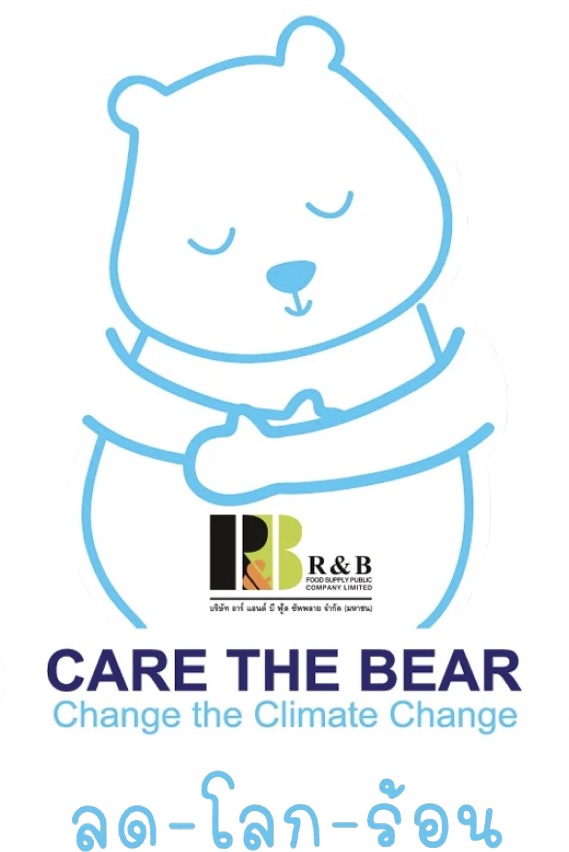

Environment
The Company is committed to effective environmental management and are ready to cope with climate change which is one of the important issues for sustainable business operations.
The Company places importance on environmentally friendly management to prevent and reduce negative impacts in various aspects that may occur as well as to ensure that the Company uses resources with value and maximizes benefits in order for the Company to achieve its corporate vision of becoming a Carbon Neutral Company, the Company has reviewed its environmental and climate change policies and practices which cover all subsidiaries. The Board of Directors, Management, Employees, Suppliers and all Stakeholders of the Company have complied as follows:

Environmental Policy
Environmental and Climate Change Policy
The Company is committed to effective environmental management and is ready to cope with climate change which is one of the important issues for sustainable business operations. It also emphasizes environmentally friendly management to prevent and reduce negative impacts in various aspects that may occur. The Board of Directors has reviewed and set greenhouse gas reduction targets as follows:



Air Pollution Management
Due to the nature of the company's business operations which produce and distribute ingredients used in food that may cause odors that disturb communities surrounding the factory, the Company is aware of the importance of reducing the environmental impacts that may occur from production operations in order to ensure compliance with environmental standards and be responsible to surrounding communities, the Company has measured odor concentration and the amount of contaminants in the air discharged from the chimney. The data obtained from the environmental quality measurement process is used to determine preventive and mitigating measures for environmental impacts within the project and surrounding areas as well as to find practices to reduce the amount of pollutants generated to meet the specified standards.


Water Management
The Company realizes the importance of using water to its full potential and increasing the efficiency of water usage in the production process to the utmost in order to reduce possible impacts and maintain sufficient water resources for consumption by all sectors. Therefore, the following important projects have been implemented:
The SAVE WATER Project, aims to promote the use of tap water economically and create awareness among Employees within the Company through thinking, pondering, and making decisions together to use water resources efficiently.
The project to reuse wastewater from the RO System in the factory with the aim of reusing wastewater for activities outside the production process such as cleaning the roads in the factory, cleaning the waste storage area, cleaning the drains, and washing pallets in which originally used tap water for all of these activities.
Performance on Water Use
Water consumption
Water consumption per production unit
Reduce water consumption per production unit by
5 percent
Compared to the base year 2022 by 2027
2022
2023
2024
Remark: Information from the R & B Food Supply Public Company Limited, its Head Office.
Waste Management
Waste management is a process that helps increase the efficiency of resource use by being able to recycle or reuse waste in which is an important part of sustainable development. Therefore, the Company has implemented the following:
The Recycle Bin Project, adhering to the 3Rs waste management approach: Reduce, Reuse, and Recycle which is an approach that has been practiced both domestically and internationally. The campaign and promotion of waste reduction in the organization has been conducted together with employee training to instill and create awareness of waste separation as well as control of waste volume at the source in order to make waste management in the organization efficient.
The RBF SHARING Project: “Finished drinking water, please give me a glass” is a public relations campaign for Employees to jointly collect and donate all types and sizes of used plastic cups for recycling (Recycle) into paving blocks or chairs and forward them to areas in need in collaboration with “GREEN ROAD”.

Waste Reutilization Project due to the nature of the company's business activities, there will be leftover bread crumbs from the baking-scoring process, bread cutting-scraping, QC inspection of substandard product and from cleaning various equipment. Therefore, the Company collects these bread crumbs and forwards them to companies that use them to make animal feed in order to avoid waste and maximize the use of these resources.
The Beefung Project: The Company focuses on reducing the amount of waste from the bread production process by collecting bread scraps from trimming and reprocessing them, the remaining bread scraps can be reused again while maintaining the quality of the product at the original standard in line with the circular economy approach that aimed to create sustainability and preserve the environment.
Performance Results
Amount of waste and waste recycled Recycle/Reuse
Increase the proportion of waste and recycled waste Recycle/ Reuse by
10 percent
compared to the base year 2022 by 2027
2022
2023
2024
Remark: Information from the R & B Food Supply Public Company Limited its Head Office

Biodiversity
In assessing the link between policies and operational activities of the organization, biodiversity is related to issues that are critical to business operations. The Company aims to become a Carbon Neutral Company by 2050 by establishing plans to reduce and offset its greenhouse gas emissions of the organization which plans to participate in a voluntary greenhouse gas reduction project according to Thailand’s standards (Thailand Voluntary Emission Reduction Program: T-VER) in the forestry sector by planting/restoring forests sustainably. This is to increase green areas and conserve forest resources.
Performance results
In 2024, the Company organized the RBF Green Volunteer mangrove planting activity for the third consecutive year to cooperate in restoring and maintaining the balance of the mangrove ecosystem as well as promoting biodiversity and the abundance of marine resources. The activity also included garbage collection in the mangrove forest area as this year, the Company planted 1,000 mangrove trees.
Coping with Climate Change
Greenhouse Gas Emissions
The Company is committed to effectively managing the environment and coping with climate change which is one of the important issues for sustainable business progress in order to achieve the organization's goal of reducing greenhouse gases, the Company has planned to cope with and has the following guidelines:
The organization's carbon footprint assessment project (Head Office) to determine the amount of greenhouse gas emissions throughout the value chain as well as having been verified by the Greenhouse Gas Management Certification Unit, Phayao University which is certified by the Greenhouse Gas Management Organization (Public Organization).

Scope 3 greenhouse gas emission reporting is reporting indirect greenhouse gas emissions from purchased goods and services that are significant.
Performance Results
Amount of Greenhouse Gas Emissions
Scope 1+2
Scope 3
Carbon intensity (Scope 1+2)
Reduce greenhouse gas emissions
per production unit (Scope 1+2) by
5 percent per year
by 2030
2023
ปี 2567
Care the Bare Project in which the Company participates in the project with the Stock Exchange of Thailand to drive the reduction of global warming by campaigning for Green Meeting, support the adjustment of behavior to reduce greenhouse gas emissions from organizing meetings in Online and Onsite formats. Currently, the Company has a carbon footprint reduction from organizing activities and projects of 3,862.89 kgCO2e, equivalent to the absorption of CO2/year of 429 trees.

The RBF GO GREEN project "Planting fast-growing economic trees and increasing green space in Phaya Mengrai District, Chiang Rai Province" The Company plans to join the voluntary greenhouse gas reduction program according to the standards of Thailand (Thailand Voluntary Emission Reduction Program: T-VER) of the Greenhouse Gas Management Organization (Public Organization) or TGO to achieve the goal of becoming a carbon neutral organization by 2050.

Energy
The Company emphasizes sustainable energy consumption, aiming to reduce unnecessary energy consumption, reduce greenhouse gas emissions and promote the use of environmentally friendly renewable energy in order to achieve the goal and maintain the balance between economic development and environmental conservation, the following important projects have been implemented:
The SAVE ENERGY project aims to support and promote energy conservation to ensure efficient and cost-effective energy use. The Company has conducted training and instilled awareness in all sectors of Employees to understand the importance of energy conservation and participate in sustainable energy management in the organization including the selection of LED light bulbs which have low energy efficiency and the maintenance of machinery and equipment to work at full efficiency to help reduce unnecessary energy consumption and increase the efficiency of the organization's operations.
Performance Results
Electricity consumption
Electricity consumption per unit of production
Reduce electricity consumption per unit of production by
5 percent
compared to the base year 2022 within 2027
2022
2023
2024
Remark: Information from R&B Food Supply Public Company Limited, its Head Office
The SOLAR ROOFTOP Project is one of the projects that the Company has implemented to support the use of renewable energy by installing solar panels on the roof of the building (Rooftop) to produce electricity from solar energy which is a clean energy source with no impact on the environment. It also helps reduce greenhouse gas emissions from using electricity from other sources, reducing long-term energy production costs. Currently, the Company has installed a solar rooftop power generation system in 3 subsidiaries in Thailand.
Performance Results
Power Generation
Amount of Solar Power Use
Reduced Greenhouse Gas Emissions
Increase the proportion of renewable energy use by
20 percent
compared to the base year of 2022 by 2027
